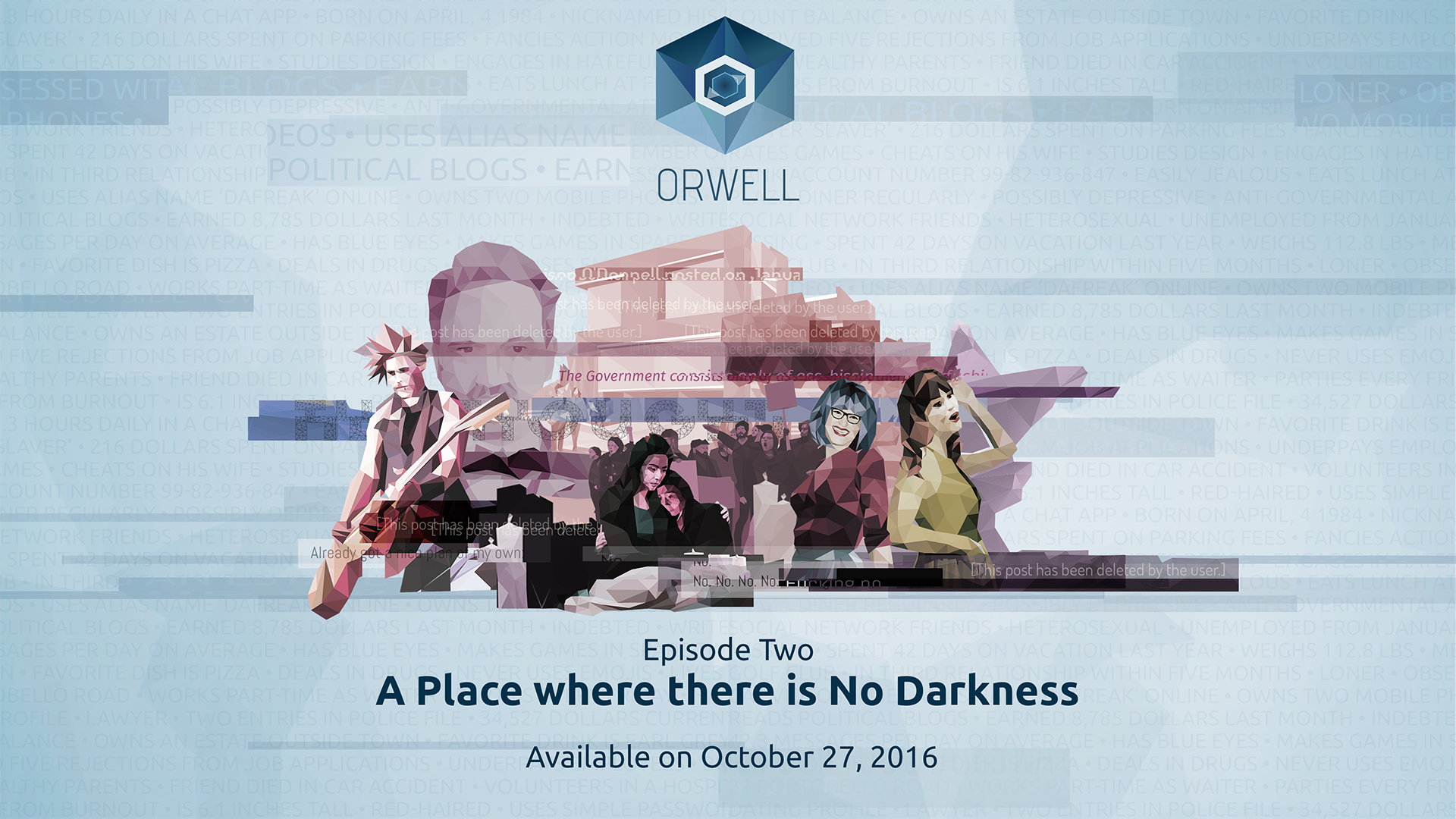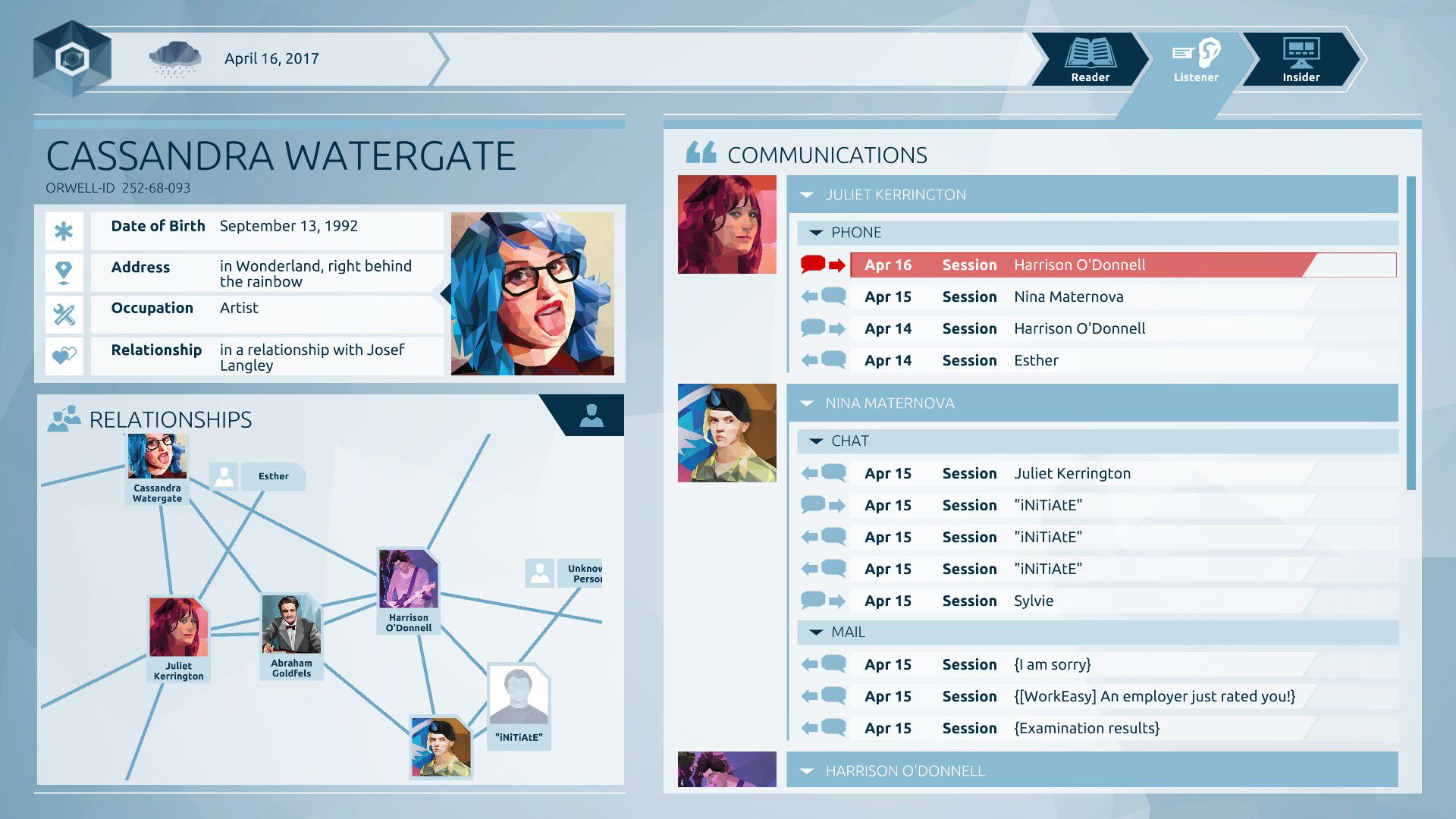Orwell is a simulation video game in which the player assumes the role of a state operative and monitors surveillance sources to find national security threats. The game was released by indie developer Osmotic as a weekly, five-part serial for Windows beginning on October 20, 2016.
trailer:
Orwell takes place in a country called The Nation, led by a modern-day authoritarian government known as The Party in the capital of Bonton. In 2012, the Party passed the Safety Bill, a law expanding the government’s ability to spy on its citizens in the name of national security. As part of the bill, the Ministry of Security (led by Minister Catherine Delacroix) commissioned a covert surveillance system known as Orwell, formerly known as Demiurge.
Orwell allows investigations into the private communications of people of interest, but doesn’t allow any one person full access. Instead, Orwell’s operation is run by two groups; Investigators, persons outside of the Nation working for the government who search through the communication of target persons and upload items of interest (represented as “datachunks”), and Advisors, people inside of the Nation who use the received datachunks to determine the course of action and to recommend actions to the authorities.
The player takes the role of an Orwell investigator, who has just been selected to use the system.
Episode 1
On April 12th, 2017, a bomb explodes in the populated Freedom Plaza in Bonton, destroying the statue and killing several people. A note containing the first three stanzas of the German folk song Die Gedanken sind frei (“The Thoughts are Free”) is found at the site. Present at the Plaza shortly before the explosion was Cassandra Watergate, an artist who was arrested for assaulting a police officer at a protest at the Plaza several weeks prior. The player is tasked by their assigned Advisor “Symes” to investigate Cassandra as their only lead, with the goal of determining whether she had anything to do with the bombing.
The player explores Cassandra’s various correspondence and finds various connections – Her acquittal from the assault charge due to lack of evidence, her relationship with her defence lawyer Josef Langley, her reliance on antidepressants, and her association with a group called Thought via a man called Goldfels.
Eventually, Cassandra confesses in a private conversation with “Juliet” that she did assault the police officer in a rage, although Juliet counters that Cassandra did it to defend her against him. It is up to the player which version they upload, but either way the assault charge is reopened and Cassandra is again arrested for it.
Suddenly, a second bomb explodes at Bonton’s Stelligan University, ruling Cassandra out as the bomber.
Orwell creates a fabulously convincing microcosm of the internet, which offers a perceptive cross-section of the media and of the narcissism of Facebook, Twitter et al.
The media is also excoriated. News sites are presented as puppets of power, focused intensely on self interest. One of my favorite sections is a hilariously sycophantic interview on a major news website, with an entrepreneur who also happens to be a major advertiser.
I got a kick out of knee-jerk outrage from homophobic internet commenters, the douchebag musings of slacktivist bloggers and craven “I-can-see-both-sides” types wedging themselves pointlessly into the conversation. A host of characters act as surrogates for various viewpoints on the safety-or-liberty spectrum, from well-meaning fools to dangerous fanatics. They are recognizably familiar people, but they are never stereotypical.
Orwell‘s use of readily supplied slugs of information means there’s usually little challenge involved in identifying what is likely to move the story forward. Artificial intelligence and game design is not far enough evolved to simply allow me to find and create my own montage of information, and so I mostly allowed myself to be lead by my nose towards the conclusion.
For me, there were occasional times when leads ran dry and I became lost in a maze of documents, searching for the key to progress, like a bad RPG player wandering around dungeon corridors. These moments were frustrating, but diligent research always yielded progress, eventually.
The Orwell system says it only wants information that is relevant. My boss scolded me when I uploaded something trivial. But when I was lost, I found myself just throwing information at the database, hoping that something might turn out to be useful. Often, Orwell failed to highlight data that was obviously going to be useful, like a person-of-interest’s photograph, only to later put the data in play, once other narrative doors had been unlocked.
But these shortcomings are forgivable in a game that innovates so smartly in turning a gripping drama into a work of genuinely interactive fiction. While the player’s choices are partly plot-driven, they are also deeply moral.
It’s obvious from early in the game that Orwell is a nasty piece of work. My first target is taking medication for anxiety. I upload this information, thinking it might come in useful. Orwell decides this means she has an unstable personality.
Following this outrageous leap, I’m much more cautious about my decisions. It also made me really scared about the information I put online about myself, and how it might be used against me.
But as a government snitch, at least in this game, my job is to be vigilant. This is not merely a Kafka-esque exercise in domination and power. Bombs are going off. People are being killed. It’s the state’s job to catch the murderers.
It’s significant that Orwell is actually good at what it does, even while it tramples upon civil liberties and basic decency. By uploading certain data-chunks, I know that I trigger consequences beyond my control. In contrast, if I cut the individuals I watch some slack, I might be endangering civilian lives.
- developer:Osmotic Studios
- publisher:Surprise Attack Games
- date of release:20.october 2016


Your Comment Here